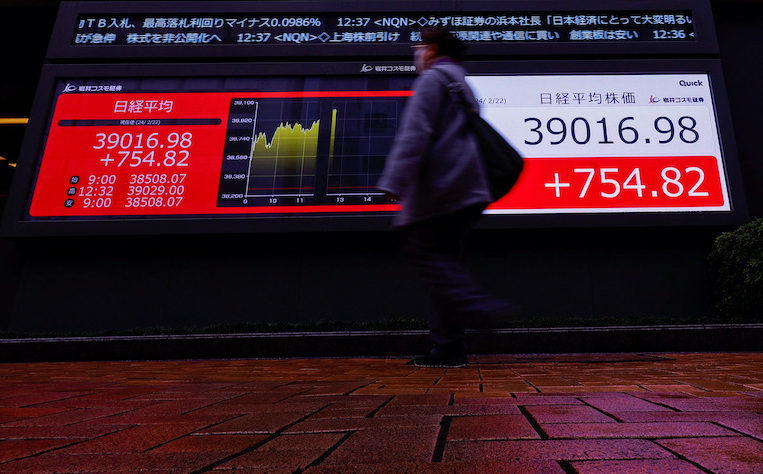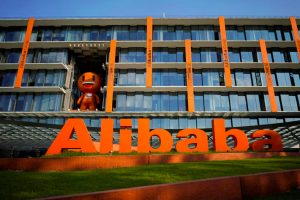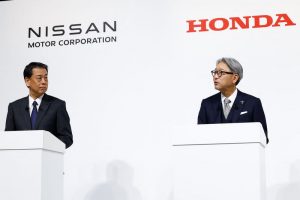Global investors looking to distance themselves from Chinese equities are betting on Japan’s soaring markets, and adding fuel to the Nikkei’s eye-popping rally to all-time highs.
Investors who have historically owned Chinese stocks but are now keeping a distance for fear of US sanctions say owning a Japanese firm that either sells to China or is based there is becoming the more politically palatable option.
“If a client owns Japan, even though the exposure is China’s kind of proxy, your client is much less likely to ask you a political question if the portfolio didn’t perform as well,” Liqian Ren, director of Modern Alpha at WisdomTree Asset Management in Philadelphia, said.
Also on AF: Chinese Firms Withdraw IPOs at Record Rate Amid Regulatory Ire
Buying Japanese stocks is “less controversial in the US political environment right now”, she added.
Those bets have translated into mega rallies in Nikkei heavyweights with a significant presence in China.
Chip giant Tokyo Electron and Uniqlo parent company Fast Retailing have gained 126% and 63%, respectively, over the last 12 months.
Similarly, ASICS Corp, which has subsidiaries in countries including China, is up about 91%. Japanese restaurant chain Saizeriya, a popular brand that has made a mark in China, has climbed 62%.
A tale of two economies
China, Japan’s largest trade partner, is the third largest destination for Japanese investment, after the United States and Australia.
While the countries may be intertwined economically, the current state of their financial markets could not be more of a contrast.
Japanese equities broke past levels not seen for over three decades this month and are scaling all-time-highs. The benchmark Nikkei index is up 18% for the year already and has risen a whopping 43% in the last 12 months.
View this post on Instagram
On the other hand, China’s blue-chip CSI300 index hit five-year lows this month, and is down more than 14% since last year, pummelled by property market troubles and a lack of large-scale stimulus.
While Japanese offshore funds received $6.3 billion worth of inflows last month, adding to inflows of $7.84 billion last year, about $6.59 billion has flowed out of China offshore funds since April 2023, LSEG data shows.
“We are seeing a lot of flows in our hedge fund book globally coming out of China, and … a lot is coming into the Japanese market,” said Bruce Kirk, chief Japan equity strategist at Goldman Sachs.
Some cautionary tales too
Japan’s chip-sector giants have helped to fuel the Nikkei’s 17% gains this year, with Tokyo Electron and chip-testing equipment maker Advantest ranking among the top performers.
Even companies with slim links to China, such as Recruit Holdings and Toyota Motor, are up sharply.
But Chinese ties can serve as a major buoy or bludgeon to Japanese companies.
The earnings of a cosmetic firm banking on China’s beauty market, were battered by the slowing economy and its shares have fallen 32% in a year.
Even so, whether investors come to Japan seeking China proxies or complete disconnection, the shadows cast over China have given the Nikkei an undeniable boost.
In the end though, analysts see fundamentals such as corporate governance reforms and earnings at index heavyweights as key to future inflows.
“The China replacement trade is like extra icing on the top,” said WisdomTree’s Ren.
- Reuters, with additional editing by Vishakha Saxena
Also read:
Euphoria in Japan as Nikkei Surges to a Record High
Japan Slips Into Recession, But BOJ Still Seen Ending Stimulus
Scandal-Hit Toyota Still World’s Top-Selling Automaker
Warren Buffett Says He Prefers Investing in Japan to Taiwan
Japan to Pump $4.9bn Into Second TSMC Chip Factory Plan
Japan Warns Trump: ‘Don’t Do a Deal With China If You Win’
Huawei, SMIC Set to Defy US Sanctions With 5nm Chips: FT
























